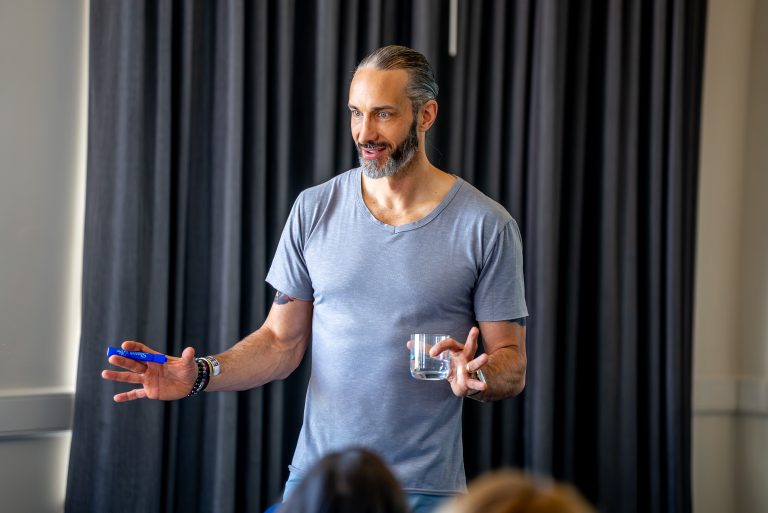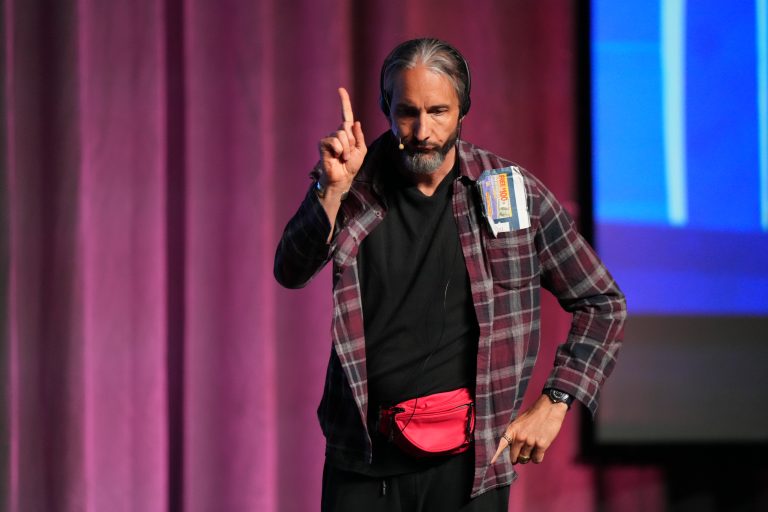Make more money.
Keep your money.
Grow your money.
And always…grow yourself.
In order to build wealth, it is essential that these objectives be prioritized.
“Grow yourself” is the one that encompasses and improves all areas of your life—financial and otherwise—at all times.
- If you want to make more money, start by creating more value.
- If you want to improve your cash flow, start by improving your efficiency and boosting your bottom line.
- If you want to grow your money, learn to leverage your Investor DNA and become a better investor.
These are the perspectives of the Producer Paradigm. The mindset from which you create more value than you consume and take responsibility for your results.
Producers know that wealth is a byproduct of value, and creating more value comes down to “grow yourself,” aka:
- Take care of your health.
- Increase your emotional intelligence.
- Define and enhance your quality of life.
- Relax, rejuvenate, and recreate.
- Surround yourself with people who positively challenge you.
- Do therapy and heal.
- Embrace your hobbies.
- Create maximum value in all interactions.
You get the point.
Wealth is a game of production and value creation.
The Consumer Condition
Yet we live in a world where many don’t want to take responsibility or are unwilling to grow themselves, yet cry for more benefits for themselves.
These are the Consumers.
Consumers want things to be easy.
Consumers don’t want to think about it.
Consumers demand security.
Consumers point out all the wrong in the world but rarely look in the mirror.
Consumers feel they are owed something by the world.
Consumers believe wealth is a game of chance and security comes from the outside…outside of their ability or control.
Consumers look for answers from governments, churches, friends, family, programs like social security, and anyone…well, anyone but themselves.
They have a disease of the mind called the Consumer Condition.
They want you to believe they are victims.
They play the blame game.
They yell the loudest.
They know how to get attention.
They believe everything to be a zero-sum, win-lose game of scarcity.
They want what you have but are unwilling to do the work.
We all have people we love who are caught in the Consumer Condition. And there may be areas of our life where we are playing the victim or blinded by scarcity.
Being in the Consumer Condition doesn’t mean people aren’t loving or lovable. It just means they aren’t living their best life. It means their ideas trap them in a life of frustration, without accountability, and limiting their ability to be value creators.
Some of the traps are more subtle.
Like when I withhold love because I feel hurt. Or I’m upset with someone and allow it to hijack or sabotage my productivity and leak into my conversations.
It happens to the best of us. We may not be impervious to circumstances that trigger past hurts or habits that don’t serve us, but we do have a choice.
What will we do once we are aware? Fight and defend? Or take responsibility and learn?
In money and finance, when things don’t go according to plan, how do you feel? How do you react? Who do you blame? How much time do you allow for frustration and despair?
The Money Habits of Consumers and Producers
The Consumer Condition influences behavior that creates risk, limits wealth, and invites volatility.
Consumers skip steps and chase returns with investments prematurely.
Consumers are taught to save for retirement but at the expense of investing in themselves or before plugging financial leaks.
Consumers have a harder time valuing themselves or their time.
Consumers aren’t as likely to understand opportunity cost.
Consumers are less likely to invest in their personal development due to fear or the limited belief that wealth is a game of luck.
It’s easy to watch account values grow from our allocation, but sometimes harder to see immediate results when improving our skill sets. Not all the time, but sometimes.
And if the development of a business, or skills, or a team to support us is seen as an expense, it feels at odds with building wealth when it might be the very thing that makes the biggest difference.
Producers realize they are their greatest asset and value creation is the way to wealth.
Consumers are more likely attracted to the accumulation model.
In the accumulation model of “set-it-and-forget-it” for the “long haul,” invest early often, dollar cost averaging, etc., we are encouraged to start saving ten percent of our income as soon as possible. (And sometimes this “encouragement” comes in the form of guilt and shame from well-intentioned family and friends.)
The younger the better right?
FOMO is the fuel.
Consumers are likely to miss out on life with this faulty advice. The Consumer Condition fuels the miser mindset where more time is spent on cutting back than creating value. The Consumer Condition creates an obsession with reduction, leading to a dull life, minimizing energy, and limiting joy.
A Producer knows healthy habits support value creation.
Pay yourself first from day one.
Take a percentage off the top and build a peace of mind fund so you have liquidity.
It is hard to maximize production when you lock money away until age 59.5 in some plan you aren’t supposed to touch, in funds you don’t understand, with no plan on how to enjoy the money in the future (exit strategy).
Unfortunately, retirement plans aren’t savings vehicles and are fueled by volatile (sometimes speculative) investments.
There are more important steps in your financial journey to consider first.
Sure, there is the argument for the time value of money. I get it. Compound interest looks and performs better with more time. I’ve seen—and shown—the charts encouraging people to start immediately.
To be more productive, plug financial leaks first. Make more of your money count.
Producers know their mindset is crucial in adding value and being productive. Building a peace of mind fund can assist through liquidity now before locking away a single cent.
Producers know it is especially important to create productive habits, create financial systems and frameworks, and increase skills and knowledge to create more value, to be of more value.
Consumer Conversations Around Money
Consumers have confusion around the words “saving,” “investing,” and “speculating.”
Semantics matter in matters of money.
Savings are liquid, without risking principal.
Investing can have volatility with growth opportunities.
Speculation has risk due to lack of knowledge or lack of ability to mitigate risk or not knowing how something works—what most people refer to as “investing.”
“Putting our money to work” is often more work than we want to admit. Looking for passive income isn’t necessarily a passive activity. Accumulating money in retirement plans is easier, but doesn’t create cash flow, delaying economic independence.
We’ve been misinformed. We bought into a myth. The myth that the market has earned ten percent or will earn ten percent and that compound interest will get us where we want to go.
These ideas have been indoctrinated in us for so long that we rarely question them, measure them, and worst of all, rarely experience them. Yet so many people keep applying them without enough results.
Why?
Marketing. The Consumer Condition. The belief that it is too complicated. That we don’t have the time to figure out something better. That we can’t develop the expertise.
So I guess we have to trust Wall Street and the Ivy League geniuses.
Make the Right Decisions by Choosing the Producer Paradigm First
But how do we win?
And what does it cost?
And what do we give up?
And what can we learn along the way?
Sometimes we get boxed into a quiz on money that feels like multiple choice. Stocks or bonds.
Are those really the only options? Of course not, but that is what most people “choose.”
Choose the Producer Paradigm. Make more money by creating more value. Keep more of what you make without cutting back.
And then ask: What does investing look like for you?
Could it be real estate? Intellectual property? Could it make sense to pay off a loan before funding your retirement? Are there investments that can create cash flow for you? Or are there areas you have expertise or would like to develop expertise?
If you don’t want to learn…
If you don’t want to take any risk….
If you don’t want to worry about complicated financial structures….
…then you can always pay off loans, find ways to earn more money, save on tax, design insurance efficiently, and store money in a properly structured, optimally funded whole life insurance policy.
It would remove the volatility. It would reduce the risk, and tax.
Funding whole life doesn’t require skill or effort. It does however limit your upside and also removes the downside.
Maybe your opinion will change over time as well. Maybe you come across a great opportunity in the future. You can tap into your cash then, but you don’t have to.
Merely saving money through efficiency, and capturing it in your policy, will put you ahead of 90 percent of the people who are funding retirement plans.
Efficiency and wealth capture. Not budgeting and scrimping.
If the goal is to be a multimillionaire, there are many ways to get there. Producer or Consumer…that is the real question.
Consumers read articles, even books, about how to live like a cheapskate to become a multimillionaire. Reducing expenses and limiting value.
Sure, you’ll be one on paper, but in life, live like a pauper.
My preference is to be a Producer. Producers increase income by adding more value, they seek to serve more people, or deeply impact people…these facets are the creed of the value creator. Of the Producer.
The Producer Paradigm is one of stewardship, expansion, value creation, and impact.
Got a business idea? Score it in 2 minutes with the free Idea Optimizer and see how it stacks up against the Win-Then-Play approach.
If putting money away for retirement is at odds with you being a Producer, if it is at odds with investing in yourself, retirement planning will reduce wealth and delay progress.
Produce more than you consume.
Seek to add maximum value.
Invest in you.
What prevents you from investing in yourself? Time? Fear? Confusion?
Sometimes the desire to hold onto dollars limits the velocity at which we can expand our ability to add value. It is a perspective of preservation over production, scrimping over creating, and waiting over action.
To make money while you sleep be more effective while you are awake. Or to create recurring revenue and cash flow, requires a different type of thinking, a different framework.
Being a Producer isn’t about accumulating, but acceleration. Rather than contributing money without consideration for cash flow, you take responsibility, you ask different questions, and you create better results.
You can accelerate when you are economically independent. When you have cash flow that comes from assets that don’t require you to show up to a job where you trade time for money, you have more choice and freedom.
Producers create prosperity.
You choose prosperity by creating a life of value, a life you love.
Producers see wealth as a responsibility and duty to serve others and solve problems.
Producers don’t cut corners, and don’t look for hacks. Producers do the work that is required to manage wealth and energy through their actions.
Producers are willing to go to the “mental gym.” Working on themselves, growing their skills, and being of more value. Just like we build muscle in the gym, Producers build the ability to produce through education, action, and stewardship. Producers utilize and develop their gifts. Producers learn from mistakes. Producers add value to people’s lives.
Consumers look to take more value than they create.
Consumers skip the step of finding a career that matters most to them.
Consumers skip creating cash flow and instead primarily focus on funding retirement plans.
Consumers skip learning and merely tolerate it as part of investing.
The Producer Paradigm is the opposite of the Consumer Condition.
Producers realize that to grow wealth, they grow themselves.
Producers grow themselves and then support others in their growth through value creation.
Make more money.
Keep more money.
Then grow your money.
Producer or Consumer. The choice is yours.
Ready to Stop Guessing With Your Money?
Most financial advice tells you to save more and spend less. That’s a losing game. Garrett’s free book Killing Sacred Cows reveals why the conventional wisdom is costing you—and what to do instead.
Do it yourself? Try the free Money Snapshot tool on X1 Wealth.
Frequently Asked Questions
What is the Producer Paradigm?
The Producer Paradigm is the mindset of creating more value than you consume. It prioritizes making money through value creation, keeping money through efficiency, growing money through smart investing, and always growing yourself. It’s the opposite of the consumer mindset.
How do I make more money as a Producer?
By creating more value. Focus on leveraging your unique abilities, solving bigger problems, and serving more people. Producers earn by contribution, not just effort — and value creation is the engine of wealth.
What does ‘grow yourself’ mean in wealth building?
Grow yourself means investing in your knowledge, skills, relationships, and health — the mental and relationship capital that create financial capital. It’s the multiplier that improves all areas of your life simultaneously, not just your bank account.
What is the Value Equation?
The Value Equation is: Mental Capital × Relationship Capital = Financial Capital. Your knowledge and skills (mental capital) combined with your network and trust (relationship capital) determine your earning potential. Money is the byproduct of value creation.



